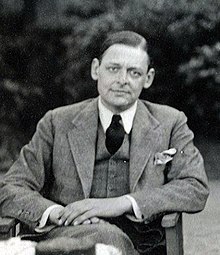T. S. Eliot | |
|---|---|
 Eliot in 1934 | |
| Born | Thomas Stearns Eliot 26 September 1888 St. Louis, Missouri, U.S. |
| Died | 4 January 1965 (aged 76) London, England |
| Occupation |
|
| Citizenship |
|
| Education | |
| Period | 1905–1965 |
| Literary movement | Modernism |
| Notable works |
|
| Notable awards |
|
| Spouses | |
| Parents | |
| Relatives | Eliot family |
| Signature | |
Thomas Stearns Eliot OM (26 September 1888 – 4 January 1965) was a poet, essayist and playwright.[1] He was a leading figure in English-language Modernist poetry where he reinvigorated the art through the use of language, writing style, and verse structure. He is also noted for his critical essays, which often re-evaluated long-held cultural beliefs.[2]
Born in St. Louis, Missouri, to a prominent Boston Brahmin family, he moved to England in 1914 at the age of 25 and went on to settle, work, and marry there.[3] He became a British subject in 1927 at the age of 39 and renounced his American citizenship.[4]
Eliot first attracted widespread attention for his poem "The Love Song of J. Alfred Prufrock" from 1914 to 1915, which, at the time of its publication, was considered outlandish.[5] It was followed by The Waste Land (1922), "The Hollow Men" (1925), "Ash Wednesday" (1930), and Four Quartets (1943).[6] He wrote seven plays, notably Murder in the Cathedral (1935) and The Cocktail Party (1949). He was awarded the 1948 Nobel Prize in Literature, "for his outstanding, pioneer contribution to present-day poetry".[7][8]
- ^ Bush, Ronald. "T. S. Eliot's Life and Career", in John A Garraty and Mark C. Carnes (eds), American National Biography. New York: Oxford University Press, 1999, via [1] Archived 2022-04-17 at the Wayback Machine
- ^ "T.S. Eliot | Biography, Poems, Works, Importance, & Facts | Britannica". Britannica.com. Retrieved 12 April 2023.
- ^ "The Nobel Prize in Literature 1948". NobelPrize.org. Retrieved 20 April 2021.
- ^ Sanna, Ellyn (2003). "Biography of T. S. Eliot". In Bloom, Harold (ed.). T.S. Eliot. Bloom's Biocritiques. Broomall: Chelsea House Publishing. pp. (3–44) 30.
- ^ Eliot, T. S. (21 December 2010). The Waste Land and Other Poems. Broadview Press. p. 133. ISBN 978-1-77048-267-8. Retrieved 9 July 2017. (citing an unsigned review in Literary World. 5 July 1917, vol. lxxxiii, 107.)
- ^ "Thomas Stearns Eliot", Encyclopædia Britannica. Retrieved 7 November 2009.
- ^ "The Nobel Prize in Literature 1948". Nobel Foundation. Retrieved 26 April 2013.
- ^ "The Nobel Prize in Literature 1948 – T.S. Eliot", Nobel Foundation, taken from Frenz, Horst (ed). Nobel Lectures, Literature 1901–1967. Amsterdam: Elsevier Publishing Company, 1969. Retrieved 6 March 2012.